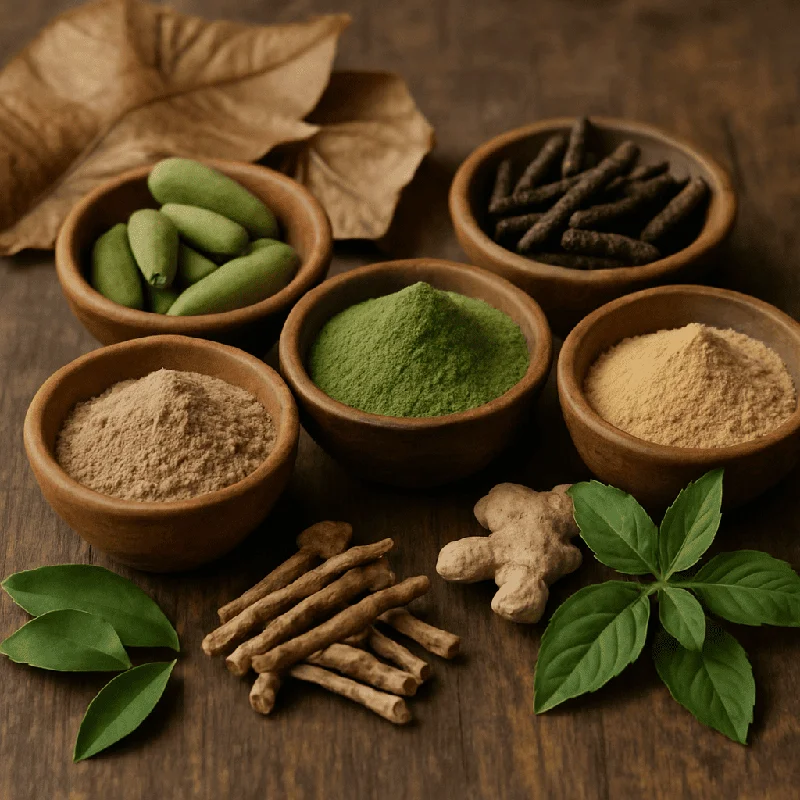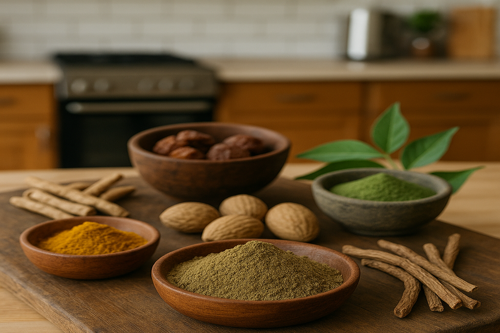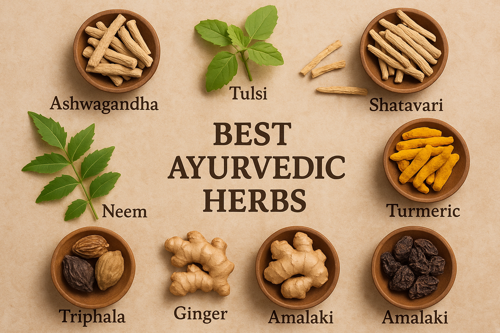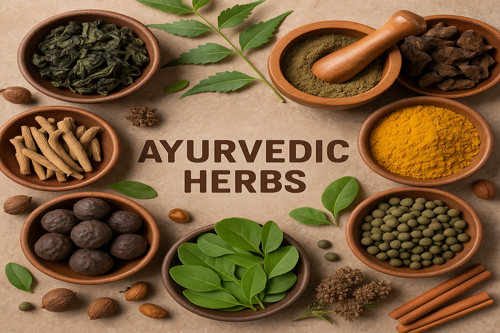Ask Ayurvedic doctor a question and get a consultation online on the problem of your concern in a free or paid mode. More than 2,000 experienced doctors work and wait for your questions on our site and help users to solve their health problems every day.
Ayurvedic Herbs: Natural Healing Benefits for Mind and Body

There’s something endlessly fascinating about the way ancient wisdom keeps coming back into our lives — like it’s tapping us on the shoulder, saying, “Hey, remember me?” Ayurvedic herbs are a perfect example. Thousands of years ago, healers in India figured out that plants — regular plants, not shiny pills or complicated syrups — could work real magic on the human body and mind. Fast forward to today, and these ayurvedic herbs are still some of the best allies we have for natural healing. Whether you’re thinking about boosting your immune system, calming your anxiety, or just getting your digestion back on track, there’s pretty much always a plant for that. In this article, we’re going to dive deep — real deep — into the best ayurvedic herbs, how they work, and how you can (easily, painlessly) bring them into your everyday life. Oh, and if you think this will be boring? Spoiler: it won’t.

What Are Ayurvedic Herbs?
Okay, quick story: a friend of mine once thought “Ayurvedic” was some trendy spa treatment involving golden oils and flute music. Not exactly wrong — but Ayurveda, the “science of life,” is way bigger than that. It’s a 5,000-year-old system of medicine that treats the body, mind, and spirit as one interconnected being.
Ayurvedic herbs? They’re the green, leafy, earthy heart of it all. These herbs are used to balance your doshas (your body's natural energies — think Vata, Pitta, and Kapha), and restore overall health. Unlike popping a pill for a headache, Ayurvedic healing looks at why your head hurts: maybe it's digestion, stress, or even blocked emotions.
There’s a full ayurvedic herbs list out there, but today, we’re focusing on the real heavy hitters — the best ayurvedic herbs that have stood the test of time. Not just because they sound good, but because they actually do good.
Key Benefits of Ayurvedic Herbs
You know that feeling when you find something that actually works — like really works — and you just want to tell everyone about it? Yeah, that’s what Ayurvedic herbs feel like when you get it right.
Immune system support
When I started experimenting with ayurvedic herbs for immune system health, I honestly didn’t expect much. A little turmeric here, a little ashwagandha there. But somehow, over months (not overnight — important detail!), I noticed I wasn’t getting those random colds anymore. Herbs like Guduchi, Ashwagandha, and Amalaki gently strengthen your defenses without blasting your system the way synthetic supplements sometimes do.
Stress relief and mental clarity
Look, we’re all stressed. If you’re alive in 2025, you’re stressed. It’s not even a question. That’s where ayurvedic herbs for stress and anxiety come in clutch. Ashwagandha and Brahmi are like a hug for your nervous system. They don’t just sedate you — they make you more resilient. And Brahmi, oh man, if you’ve ever needed to focus without feeling wired, it’s your herb.
Digestive health and detoxification
Honestly, digestion is at the root of everything. Ayurveda gets that better than any other system I’ve seen. Ayurvedic herbs for digestion, like Triphala, are brilliant because they don’t just nuke your symptoms; they rebuild your digestive fire (Agni) from the ground up. Plus, herbs like Trikatu and Neem sneakily support detoxification — without scary juice cleanses.
Skin, hair, and reproductive support
Fun fact: your skin is basically your inner health turned inside out. So if you're chasing glow, strength, or anything beauty-related, you need to think deeper than creams. Ayurvedic herbs for skin, like Manjistha, work on blood purification. Ayurvedic herbs for hair growth? Bhringraj and Amla are the OGs. Reproductive health? Hello, Shatavari, you absolute queen.

Most Powerful Ayurvedic Herbs and Their Uses
Alright, now that we’ve covered the "why" behind ayurvedic herbs, let’s get to the good stuff — the actual plants that people swear by. Think of this like your backstage pass to the VIP list of Ayurveda’s most trusted herbal allies.
Ashwagandha – stress, energy, immunity
If you’ve heard of one Ayurvedic herb, it’s probably Ashwagandha. And for good reason. It’s an adaptogen, which basically means it helps your body adapt to stress instead of crashing under it. Whether you're battling deadlines, toxic group chats, or just a weird sense of existential dread (relatable?), Ashwagandha is your buddy. Bonus points: it also supports the immune system and boosts energy levels without making you feel jittery. Seriously, I wish I could text Ashwagandha a thank-you.
Brahmi – memory, focus, calm
Picture that moment when you sit down to work, and instead of spiraling into twenty tabs and a mild panic attack, you actually... focus. That’s the Brahmi effect. Known traditionally for sharpening memory and calming the mind, Brahmi is one of the best ayurvedic herbs for mental health. Students, entrepreneurs, frazzled parents — basically anyone with a brain — can benefit from its calming, focusing powers.
Turmeric – inflammation, joints, digestion
Turmeric is everywhere these days — golden lattes, fancy wellness shots, even skin care masks. And while the hype can be exhausting, it’s actually deserved. Turmeric’s active compound, curcumin, is a powerhouse for fighting inflammation. It’s one of the best ayurvedic herbs for digestion too. Sprinkle it in your cooking, stir it into teas, or — controversial opinion — just eat it raw with a little black pepper for better absorption. (I tried it. It’s weird. But effective.)
Triphala – detox, digestion
If your gut isn’t happy, trust me, nothing else will be either. Triphala — a blend of three fruits: Amalaki, Bibhitaki, and Haritaki — is the ultimate gentle detoxifier. Unlike those sketchy "detox teas" flooding Instagram, Triphala works slowly, naturally, and intelligently. It's like the wise old auntie of Ayurvedic herbs for detoxification. Some people take it every night before bed. I tried it for a month, and let's just say... digestion nirvana.
Shatavari – hormonal balance, women’s health
If Ayurveda had a goddess herb, Shatavari would be it. This herb supports hormonal health, fertility, and emotional balance, especially for women. It's deeply nourishing — not just physically, but emotionally too. (Real talk: a cup of Shatavari tea during PMS has saved friendships.) Whether you're dealing with hormonal swings or just feeling depleted, this is one to keep close.
Gokshura – vitality, kidney support
Gokshura isn’t as famous as the others, but it deserves a spot on the ayurvedic herbs list for its vitality-boosting powers. It's traditionally used for urinary tract health, kidney support, and general rejuvenation. Plus, it has this subtle, energizing vibe — not caffeine-crazy energy, but real stamina. Think long hikes, late-night creativity bursts, or just surviving family reunions without losing your mind.

How to Use Ayurvedic Herbs Daily
Now, you might be wondering, "How the heck am I supposed to add all these herbs into my life without it becoming a full-time job?" Good question. Luckily, Ayurveda isn’t about complexity; it’s about rhythm and common sense.
Herbal teas and powders
This is probably the easiest (and most cozy) way. Many ayurvedic herbs come in powder form. Mix a teaspoon of Ashwagandha into warm almond milk at night. Brew Brahmi tea in the morning. Sip Triphala tea after dinner. It's not a ritual, it's just... drinking stuff you already love, but smarter.
Ayurvedic supplements and oils
Capsules, tablets, herbal oils for massage — there's a whole universe of options if you prefer convenience. Just, tiny PSA: buy from reputable brands. Ayurvedic herbs are powerful. You don’t want random fillers or sketchy sourcing.
Cooking with herbs and spices
This is where it gets fun. Start small: sprinkle turmeric into soups. Add cumin, coriander, and fennel seeds into your rice. A little Brahmi powder can even sneak into smoothies. Cooking with ayurvedic herbs isn’t just healthy — it tastes amazing once you get the hang of it.
Ayurvedic Therapies with Herbs
Now, if you really want to go all-in (and honestly, why not?), Ayurvedic therapies take using herbs to the next level. We’re not just talking teas and capsules — we’re talking full-body experiences.
One of my personal favorites? Abhyanga, which is basically self-massage with warm herbal oils. Imagine a slow, grounding practice where you literally soak yourself in ayurvedic herbs for skin nourishment, detoxification, and emotional grounding. (Pro tip: don’t schedule anything fancy right after. You’ll be a slippery, blissed-out noodle.)
Another therapy worth mentioning: Shirodhara, where warm herbal oil streams onto your forehead, right at the "third eye" spot. Sounds weird, feels like pure magic. It’s often used for anxiety, insomnia, and mental health balancing — pretty relevant if you’ve been spiraling in the stress vortex lately.
Panchakarma deserves its own book, but in short: it’s the granddaddy of Ayurvedic detox programs. Customized to your dosha, it uses ayurvedic herbs for liver cleansing, digestion resetting, and deep tissue rejuvenation. It’s not something you DIY on a Sunday afternoon — you’d work with a practitioner. (Or end up with some "oops" moments.)
Conclusion
If you take away anything from this whole ramble, let it be this: ayurvedic herbs aren’t a fad. They’re ancient, tested, and — when you use them thoughtfully — incredibly powerful.
Whether you’re reaching for ayurvedic herbs for stress and anxiety, exploring ayurvedic herbs for hair growth (hey, vanity counts too!), or seriously diving into ayurvedic herbs for digestion and detoxification, the key is respect. Respect the herbs, respect your body, and respect the process.
You don't have to overhaul your life overnight. Start with one herb. One cup of tea. One new ritual before bed. Maybe you’ll notice changes. Maybe you won’t at first. Either way, it’s not wasted. Healing happens in layers.
Ready to explore more? Browse our guides, book a consultation with an Ayurvedic practitioner, or just geek out over more herb wisdom. Your body will thank you — maybe not today, maybe not tomorrow — but it will.
FAQs
Can Ayurvedic herbs improve mental health and sleep?
Absolutely — many ayurvedic herbs for mental health, like Brahmi and Ashwagandha, work gently over time to regulate mood, reduce anxiety, and promote restful sleep. It’s not an instant knockout like some medications, but the balance it brings can be deeper and more sustainable.
Are Ayurvedic herbs safe for long-term use?
Generally, yes — when used properly and tailored to your dosha or needs. That said, quality matters. Always source your ayurvedic herbs from trusted suppliers and consult a practitioner if you have any health conditions or are on medications.
How to choose the right herbs for your dosha?
This part is really fun (and slightly overwhelming). Ideally, you’d work with an Ayurvedic expert who can assess your unique constitution. But broadly: Vata types might benefit from grounding herbs like Ashwagandha, Pitta types from cooling ones like Brahmi, and Kapha types from stimulating herbs like Turmeric and Triphala.
Can I combine Ayurvedic herbs with supplements or medications?
Maybe — but it’s not a free-for-all. Some herbs interact with pharmaceuticals, especially if they affect blood pressure, blood sugar, or mood. Always check with a knowledgeable practitioner or doctor who’s open to holistic approaches.
References
-
National Ayurvedic Medical Association -
Ayurveda Association of Canada -
Ayurvedic Institute -
Banyan Botanicals

